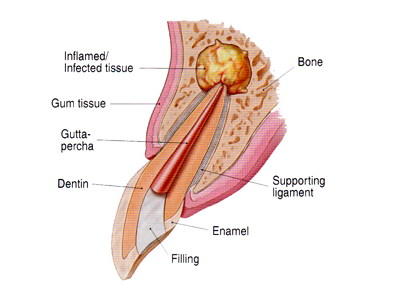| What is apicectomy?
Apicectomy is a surgical procedure to: a)Remove an infected root apex b)Clean out the surrounding infection c)Place a filling to close and seal off the new end of the tooth |
 
Apicectomy is a surgical procedure to: a)Remove an infected root apex b)Clean out the surrounding infection c)Place a filling to close and seal off the new end of the tooth
The most common reason to consider an apicectomy is persistent infection around the apex of the root, after conventional root canal treatment. This infection can cause pain, swelling and discharge over the top of the tooth in the gum (sinus).
Surgery is the best option if the root canal therapy fails to solve the problem. The suitability of apicectomy treatment can only be determined after through clinical examination of the tooth and radiological evolution.
Success rates for first apicetomies are typically between 70-80%. Our success rates are on average 80-85%. It is possible that the procedure will not completely resolve the problem and success rates are inevitably reduced for repeated apicetomies.
This depends on the position of the tooth (anterior/posterior) the treatment required, the extension of the lesion and the number of the roots. An appointment for surgery under local anaesthesia usually lasts 60 minutes.
Yes, stitches are used in the operation to close the wound and help the healing process. A very fine size thread is used to achieve a good cosmetic result which is especially important if it is for a front tooth.
These stitches can be removed in 5 days or if disposable should disappear about two weeks. We prefer to remove stitches (5th day) rather than to leave them for long period due to the higher risk of infection (food and debris stick on stitches).
You should not feel any pain immediately after the operation because the area of surgery will be numb from the local anaesthesia. As the numbness wears off, the area might become uncomfortable and you should take painkillers which will control your discomfort.
This depends on the operation and to the individual’s characteristics. There may be swelling and bruising (some people do swell and bruise more than others). Bruising and swelling is usually most obvious after two to three days and varies between patients. Swelling is settled down on the 5th day and bruise (if any) disappears in 10-14 days.
This depends on your occupation and how you will feel after the treatment. Some people need to take some time off work (1-2 days).
The main points are as follows: ·Get plenty of rest in the first few hours after your operation ·Apply some ice packs for the first two hours on the skin over the operated area (10 minutes intervals) ·Avoid going out under the sun especially during summer time ·Do not rinse your mouth or drink hot fluids ·Avoid smoking. It can delay healing and reduce the success rate ·You can eat soft food 2 hours later ·Relieve discomfort by taking pain killers as directed ·Consult your doctor if any problems ·If bleeding continues you can usually control it by placing sterile gauze over the wound and applying pressure for 15 minutes. If you cannot control it then consult your doctor ·Slight oozing is expected for a short time following the operation
·Use a chlorhexidine mouthwash or salty water (one teaspoon of salt in a cup of warm water) every 6 hours for the first 5-7 days. This will help to keep the operation site clean and clear of debris ·Avoid smoking – the local action of nicotine, the increased heat in the mouth has been shown to have a detrimental effect on healing after surgery and greatly increases the likelihood of wound infection developing ·Continue to take the painkillers and any other supplied medications (for example, antibiotics) as directed and use ice packs for the next 2 days |
What is apicectomy

